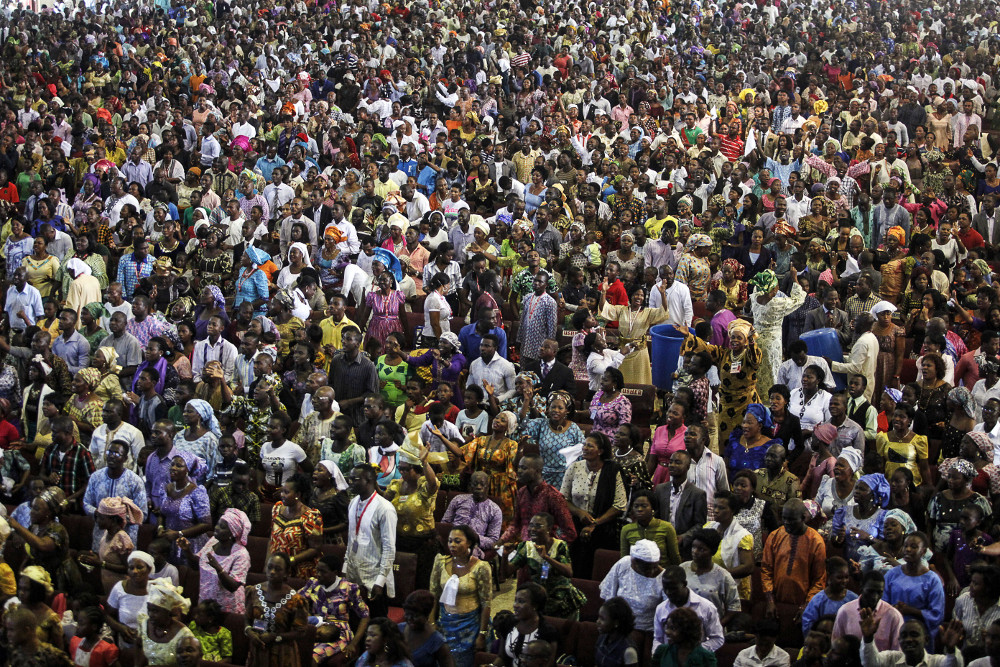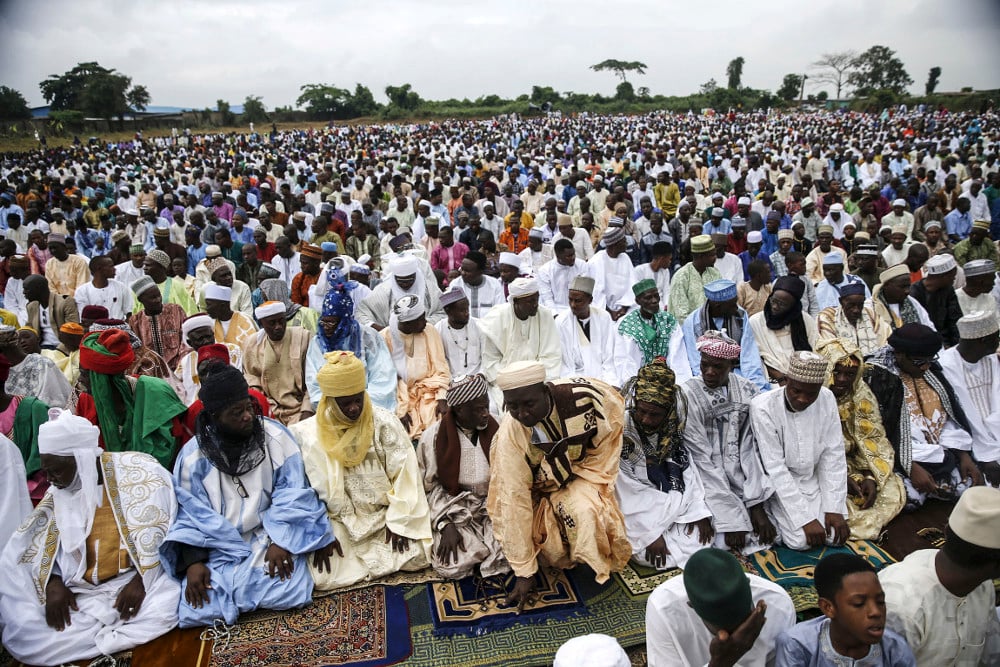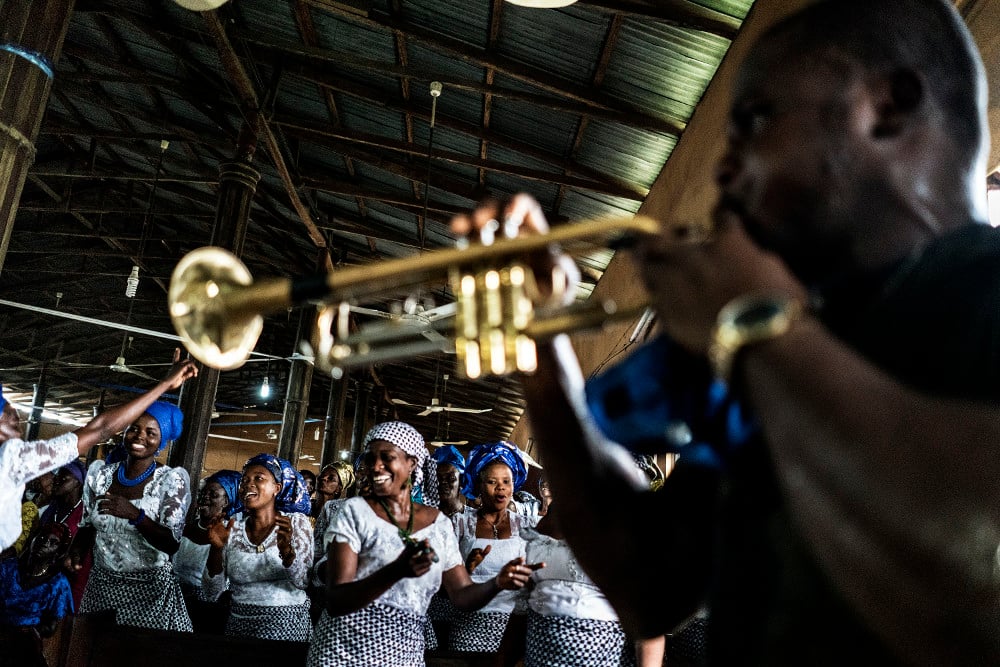Mass worship: Eyo masqueraders entertain the crowd at the Tafawa Balewa Square in Lagos.
On May 20 this year, Lagos Island in Nigeria shut down for the Eyo festival. The habitually busy streets, lined with traders, were filled with white-clad Eyo masqueraders, their brimmed Akete hats bearing the family colours. One after the other, different troupes of families made their procession into Tafawa Balewa Square, a place rich with historical significance. When two groups meet, there is a scuffle, a display of might to show which chiefdom wields more power.
As Lagos has swelled in the past 50 years, the city has allowed religion to grow and thrive with it. A recent article in one of the leading dailies highlighted that religious tourism is one of the biggest attractions annually to Lagos.
It has been five years since Lagos hosted the Eyo festival, also known as the Adamu Orisa Play — a traditional ceremony held on the occasion of the death of an Oba or other prominent Lagos citizens. The 2017 festival, hosted as part of the celebrations to mark 50 years of the official creation of Lagos State, was dedicated to Oba Yekini Adeniyi Elegushi Kusenla II, who died in 2009.
The masquerades representing the spirits of the dead in their elaborate costumes carry out their air jumps throughout the procession. Everyone is barefoot. There are no head coverings, particularly for the women even if the rain has been pouring all day.

(Akintunde Akinleye)
Journalist Kaye Whitman, in his book Lagos: City of the Imagination, described the Eyo festival as a powerful reminder of the traditional, vibrant belief in the Yoruba pantheon going back to the history, beliefs and practices of its people.
In the midst of the ghostly white costumes, a young man dressed in a black suit and dress shirt desperately tries to get away from the scene. He is the only one wearing shoes and is wondering how to get to the Anglican church at the far end of the street. The roads are closed. He doesn’t care about the ceremony or its significance; he simply wants to get away from it, shrouded in all its mystery.
The taxi driver who drove me to the venue is a Christian. He disparages the Eyo festival, stating it is a pagan ritual and he would have nothing to do with it. His only interest is that business is booming because most drivers are unwilling to risk going out on a day like this.
Lagos, like most of Nigeria, is a deeply religious society. Whether they are Christian, Muslim or traditional African, the conventions of religion are found in everyday life from greetings to business and literature. In a society torn between a love for modernity and a desire to stay relevant to cultural tradition, citizens find themselves at a crossroads.
Does the breaking of the kola nut at a Christian child-naming ceremony reduce the sacredness of the ritual? In his novel, Foreign Gods, Inc, author Okey Ndibe captures this sentiment through his character Ike, who grapples with his decision to steal the patron god and deity of his village to sell to an art gallery in New York.
Belief in a higher being largely forms part of the national psyche; unlike Karl Marx’s adage, it is anything but relegated to being the opiate of the masses.
The one thing that separates Nigeria’s Christians is the number of well-educated, highly influential members who serve as pastors and lay leaders in their churches.
Nigeria’s acting president, Yemi Osinbajo, was, until his appointment as President Muhammadu Buhari’s running mate on the All Progressives Congress ticket, a pastor of the charasmatic Redeemed Christian Church of God (RCCG) in Lagos.

(Akintunde Akinleye)
It is not uncommon to find business leaders in the pulpits, leading the congregations week after week. Despite the palpable fear of God, citizens have been unable to break the shackles of corruption that run deep in the nation.
Lagos Island (Isale Eko) bears great historical significance not only in the city’s financial and administrative history but also for its religious journey. It was here that the first churches were built, including the Anglican Church on St Paul’s Street, founded by the Church Mission Society in 1851.
On the Marina sits the Christ Church Cathedral, an imposing grey beauty whose construction began in 1869. Here, one finds the cenotaph of Samuel Ajayi Crowther, a former Yoruba slave and the first African Anglican bishop of the church who worked on the translation of the Bible into Yoruba. The Brazilian slave returnees, who first settled on Broad Street, had imbibed the Catholic faith.
It was to the credit of these returnees that the Holy Cross Cathedral overlooking City Hall was built. Records on the church’s website note that the services started off in a bamboo church until the foundation stone was laid in 1878 for a cathedral. Elaborate stained glass windows decorate the place and the external finishing is a tribute to the work of the Brazilian builders who laboured to complete their church.
Nigeria is said to be half Muslim, half Christian, although that is disputed. The Ibo brothers dominate the businesses on Lagos Island but one cannot miss the presence of the mallams or moneychangers on almost every street corner in the city. Dollar demand has stabilised in recent weeks to change at about 370 naira in the parallel market, down from a peak of more than 500 naira.
The honesty of the mallams, the Islamic brothers, is legendary. Whenever reports of an honest man returning money they found are mentioned, Nigerians ask: “Is he Hausa?” The usual adage is “Hausas can never cheat you.”
Their salat, or ritual prayer, is said five times a day. A visible companion to any Muslim in the city is a can of water for performing ablutions before prayers. If there is no mosque nearby they bow down on street corners from Adeola Odeku on Victoria Island to Ikeja on the mainland.
On Lagos Island, however, the Shitta Bey Mosque stands smack in the middle of Balogun Market, sandwiched between traders selling rich Ankara fabric and the cheap Chinese imports flooding the city.
The history of conventional churches is significant but in Nigeria mainstream churches could well take the name of the RCCG, Winners Chapel or the Christ Apostolic Church Nigeria. Largely charismatic in nature, these congregations and several others have grown from small beginnings of few congregants to mega churches with several branches all over Lagos.
RCCG boasts 2 000 parishes in Nigeria alone (according to its website), with congregations globally in Europe, France and Côte d’Ivoire. Its vision is to plant a church within a five-minute walk of another, a tenet that one sees as plausible given the numerous congregations on every street in the city.
The Winners Church, founded by Bishop David Oyedepo in 1983, is said to be present in 65 countries in the world.

(Marco Longari)
Then there are the interesting congregations such as the Church of the Lord, also called Aladura — the “praying people” in Yoruba. The church incorporates faith healing and various elements of Pentecostalism. The church was founded in southwestern Nigeria and inaugurated in 1930.
Lagos is not short of churches that promote quick fixes, prosperity and materialism. Posters with headlines such as “Give me a Spouse or I die” and themes such as “I am not a Christmas Goat” are splattered all over the city, welcoming hungry souls to the services.
The Experience concert, which takes place every October, is attended by about 250 000 people, probably making it the largest gospel concert on the African continent.
At the height of his glory, Prophet TB Joshua’s Synagogue, Church of All Nations, on the outskirts of Lagos in Ikotun, was responsible for the hospitality boom in the area. Much of this changed after 2014, when a guesthouse under construction collapsed and killed 115 people, 84 of whom were South Africans on a pilgrimage.
The polarity of the different divides will perhaps never be dealt with, but one thing is sure: Lagos’s history is equally peppered with its people’s quest for belief in some higher being.